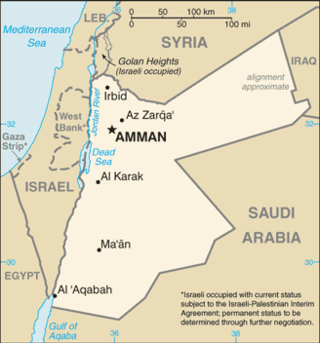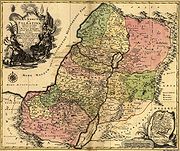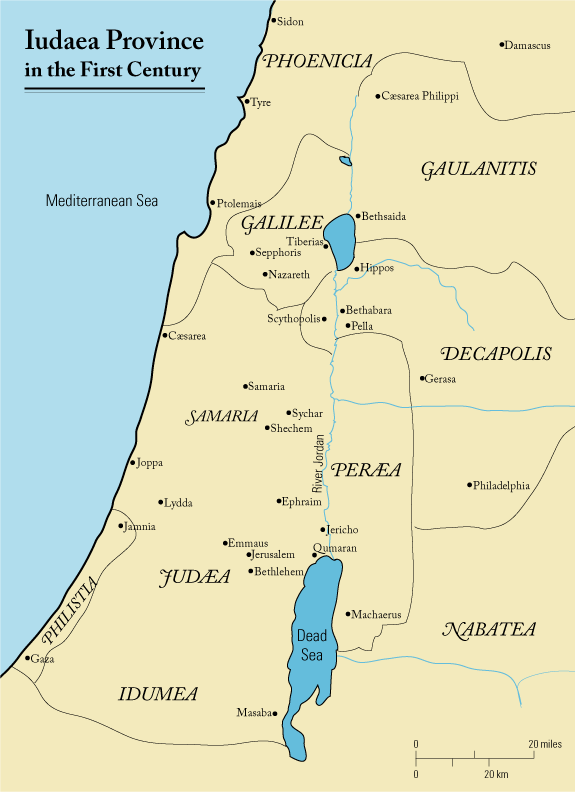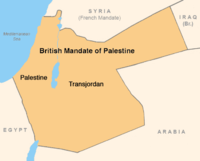
History of the Jews in Jordan
Encyclopedia

Jordan
Jordan , officially the Hashemite Kingdom of Jordan , Al-Mamlaka al-Urduniyya al-Hashemiyya) is a kingdom on the East Bank of the River Jordan. The country borders Saudi Arabia to the east and south-east, Iraq to the north-east, Syria to the north and the West Bank and Israel to the west, sharing...
was part of the history of the Jews in the Land of Israel
History of the Jews in the Land of Israel
The history of the Jews in the land of Israel can be traced from the first appearance of the name "Israel" in the historic record, an Egyptian inscription of c.1200 BCE where it refers to an ethnic group apparently located in the northern part of the central highlands between the Mediterranean and...
.
Israelite tribes

Hebrew Bible
The Hebrew Bible is a term used by biblical scholars outside of Judaism to refer to the Tanakh , a canonical collection of Jewish texts, and the common textual antecedent of the several canonical editions of the Christian Old Testament...
three of the Israelites' ancient tribes lived on the territory that is today known as Jordan
Jordan
Jordan , officially the Hashemite Kingdom of Jordan , Al-Mamlaka al-Urduniyya al-Hashemiyya) is a kingdom on the East Bank of the River Jordan. The country borders Saudi Arabia to the east and south-east, Iraq to the north-east, Syria to the north and the West Bank and Israel to the west, sharing...
: The Tribe of Reuben
Tribe of Reuben
According to the Hebrew Bible, the Tribe of Reuben was one of the Tribes of Israel.From after the conquest of the land by Joshua until the formation of the first Kingdom of Israel in c. 1050 BC, the Tribe of Reuben was a part of a loose confederation of Israelite tribes. No central government...
, the Tribe of Gad
Tribe of Gad
According to the Hebrew Bible, the Tribe of Gad was one of the Tribes of Israel.From after the conquest of the land by Joshua until the formation of the first Kingdom of Israel in c. 1050 BC, the Tribe of Gad was a part of a loose confederation of Israelite tribes. No central government existed,...
and the Tribe of Manasseh
Tribe of Manasseh
According to the Hebrew Bible, the Tribe of Manasseh was one of the Tribes of Israel. Together with the Tribe of Ephraim, Manasseh also formed the House of Joseph....
. All three tribes were tenuously located to the immediate east of the Jordan River valley.
A nation related to the Jews, the Edom
Edom
Edom or Idumea was a historical region of the Southern Levant located south of Judea and the Dead Sea. It is mentioned in biblical records as a 1st millennium BC Iron Age kingdom of Edom, and in classical antiquity the cognate name Idumea was used to refer to a smaller area in the same region...
ites or Idumaeans resided in the geographic area or present-day southern Jordan, between the Dead Sea
Dead Sea
The Dead Sea , also called the Salt Sea, is a salt lake bordering Jordan to the east and Israel and the West Bank to the west. Its surface and shores are below sea level, the lowest elevation on the Earth's surface. The Dead Sea is deep, the deepest hypersaline lake in the world...
and the Gulf of Aqaba
Gulf of Aqaba
The Gulf of Aqaba is a large gulf located at the northern tip of the Red Sea. In pre twentieth-century and modern sources it is often named the Gulf of Eilat, as Eilat is its predominant Israeli city ....
. Following the restoration of Jewish independence under the Hasmoneans, the land of Edom was annexed to the Jewish kingdom
Iudaea Province
Judaea or Iudaea are terms used by historians to refer to the Roman province that extended over parts of the former regions of the Hasmonean and Herodian kingdoms of Israel...
known as Iudaea Province
Iudaea Province
Judaea or Iudaea are terms used by historians to refer to the Roman province that extended over parts of the former regions of the Hasmonean and Herodian kingdoms of Israel...
. Judas Maccabeus
Judas Maccabeus
Judah Maccabee was a Kohen and a son of the Jewish priest Mattathias...
conquered their territory for a time around 163 BC. The Edomites were again subdued by John Hyrcanus
John Hyrcanus
John Hyrcanus was a Hasmonean leader of the 2nd century BC.-Name:...
(c. 125 BC), who forced them to observe Jewish rites and laws
Halakha
Halakha — also transliterated Halocho , or Halacha — is the collective body of Jewish law, including biblical law and later talmudic and rabbinic law, as well as customs and traditions.Judaism classically draws no distinction in its laws between religious and ostensibly non-religious life; Jewish...
. They were then incorporated with the Jewish nation.

Antipater the Idumaean
Antipater I the Idumaean was the founder of the Herodian Dynasty and father of Herod the Great. According to Josephus, he was the son of Antipas...
was of Edomite origin. He was the progenitor of the Herodian Dynasty
Herodian Dynasty
The Herodian Dynasty was a Jewish dynasty of Idumean descent, client Kings of Roman Judaea Province between 37 BCE and 92 CE.- Origin :During the time of the Hasmonean ruler John Hyrcanus 134-104 BCE, Israel conquered Edom and forced the Edomites to convert to Judaism.The Edomites were integrated...
that ruled Judea
Judea
Judea or Judæa was the name of the mountainous southern part of the historic Land of Israel from the 8th century BCE to the 2nd century CE, when Roman Judea was renamed Syria Palaestina following the Jewish Bar Kokhba revolt.-Etymology:The...
after the Roman conquest. Under Herod the Great
Herod the Great
Herod , also known as Herod the Great , was a Roman client king of Judea. His epithet of "the Great" is widely disputed as he is described as "a madman who murdered his own family and a great many rabbis." He is also known for his colossal building projects in Jerusalem and elsewhere, including his...
Idumaea was ruled for him by a series of governors, among whom were his brother Joseph ben Antipater and his brother-in-law Costobarus
Costobarus
Costobarus was the second husband of Salome I, sister of Herod the Great, and governor of Idumea. By Salome, Costobarus fathered Berenice and Antipater IV. Costobarus was accused of treason by Salome and presumably executed by Herod in 28 BCE....
.
Immediately before the siege of Jerusalem
Siege of Jerusalem (70)
The Siege of Jerusalem in the year 70 AD was the decisive event of the First Jewish-Roman War. The Roman army, led by the future Emperor Titus, with Tiberius Julius Alexander as his second-in-command, besieged and conquered the city of Jerusalem, which had been occupied by its Jewish defenders in...
by Titus
Titus
Titus , was Roman Emperor from 79 to 81. A member of the Flavian dynasty, Titus succeeded his father Vespasian upon his death, thus becoming the first Roman Emperor to come to the throne after his own father....
, 20,000 Idumaeans, under the leadership of John, Simeon, Phinehas, and Jacob, appeared before Jerusalem to fight in behalf of the Zealots who were besieged in the Second Temple
Second Temple
The Jewish Second Temple was an important shrine which stood on the Temple Mount in Jerusalem between 516 BCE and 70 CE. It replaced the First Temple which was destroyed in 586 BCE, when the Jewish nation was exiled to Babylon...
.
After the Jewish-Roman wars
Jewish-Roman wars
The Jewish–Roman wars were a series of large-scale revolts by the Jews of Iudaea Province and Eastern Mediterranean against the Roman Empire. Some sources use the term to refer only to the First Jewish–Roman War and Bar Kokhba revolt...
the Idumaean people are no longer mentioned in history, though the geographical region of "Idumaea" is still referred to at the time of St. Jerome.
Roman era
Roman rule in the region began in 63 BCE, when the general PompeyPompey
Gnaeus Pompeius Magnus, also known as Pompey or Pompey the Great , was a military and political leader of the late Roman Republic...
declared Judea a Roman protectorate. Over the years, the amount of Roman power over the Judean kingdom increased. Among the voices of opposition were John the Baptist
John the Baptist
John the Baptist was an itinerant preacher and a major religious figure mentioned in the Canonical gospels. He is described in the Gospel of Luke as a relative of Jesus, who led a movement of baptism at the Jordan River...
, whose severed head was allegedly presented at the fortress of Machaerus
Machaerus
Machaerus is a fortified hilltop palace located in Jordan fifteen miles southeast of the mouth of the Jordan river on the eastern side of the Dead Sea...
to Herod. In 66 CE, the forces behind the First Jewish Revolt took control of Machaerus, and held it until 72 CE, when a siege ensured the defeat of the local Jewish forces.
After the end of the last attempts at Jewish independence
History of ancient Israel and Judah
Israel and Judah were related Iron Age kingdoms of ancient Palestine. The earliest known reference to the name Israel in archaeological records is in the Merneptah stele, an Egyptian record of c. 1209 BCE. By the 9th century BCE the Kingdom of Israel had emerged as an important local power before...
and the destruction of Judea, the Romans joined the province of Judea (which already included Samaria) together with Galilee to form a new province, called by the familiar name of Syria Palaestina. Following Roman conquest, the lands surrounding both banks of the Jordan River with its Jewish inhabitants came under the control and decrees of subsequent empires.
Over the centuries, the Jewish population within present-day Jordan gradually declined, until none were left.
Ottoman rule
Under Ottoman rule (1516 - 1917 CE) the name "Palestine" disappeared as the official name of an administrative unit, as the Turks often called their (sub)provinces after the capital. Since its 1516 incorporation in the Ottoman Empire, it was part of the vilayet of Damascus-Syria until 1660, next of the vilayet of SaidaSidon
Sidon or Saïda is the third-largest city in Lebanon. It is located in the South Governorate of Lebanon, on the Mediterranean coast, about 40 km north of Tyre and 40 km south of the capital Beirut. In Genesis, Sidon is the son of Canaan the grandson of Noah...
(Sidon), briefly interrupted by the 7 March 1799 - July 1799 French occupation of Jaffa, Haifa, and Caesarea. On 10 May 1832 it was one of the Turkish provinces annexed by Muhammad Ali
Muhammad Ali of Egypt
Muhammad Ali Pasha al-Mas'ud ibn Agha was a commander in the Ottoman army, who became Wāli, and self-declared Khedive of Egypt and Sudan...
's shortly imperialistic Egypt (nominally still Ottoman), but in November 1840 direct Ottoman rule was restored.
British Empire

League of Nations
The League of Nations was an intergovernmental organization founded as a result of the Paris Peace Conference that ended the First World War. It was the first permanent international organization whose principal mission was to maintain world peace...
. Prior to the Treaty of Versailles
Treaty of Versailles
The Treaty of Versailles was one of the peace treaties at the end of World War I. It ended the state of war between Germany and the Allied Powers. It was signed on 28 June 1919, exactly five years after the assassination of Archduke Franz Ferdinand. The other Central Powers on the German side of...
, the World Zionist Organization
World Zionist Organization
The World Zionist Organization , or WZO, was founded as the Zionist Organization , or ZO, in 1897 at the First Zionist Congress, held from August 29 to August 31 in Basel, Switzerland...
submitted a map of the proposed Jewish state that included the eastern bank of the Jordan River and the Dead Sea, with the Hejaz Railway serving as the eastern border of the Jewish state, with the remainder to be an independent Arab state. According to the document:
"The fertile plains east of the Jordan, since the earliest Biblical limes, have been linked economically and politically with the land west of the Jordan The country which is now very sparsely populated, in Roman times supported a great population. It could now serve admirably for colonisation on a large scale. A just regard for the economic needs of Palestine and Arabia demands that free access to the Hedjaz Railway throughout its length be accorded both Governments."
In 1921, the Churchill White Paper split the British-ruled mandate into the smaller British Mandate of Palestine and Transjordan
Transjordan
The Emirate of Transjordan was a former Ottoman territory in the Southern Levant that was part of the British Mandate of Palestine...
. The border between these two new territories was delineated by the Jordan River, Dead Sea, and the valley of Arabah.
Jews and Jordanian citizenship
The Jordanian 1954 law on nationality granted Jordanian citizenship to all persons that had possessed Palestinian nationality before 15 May 1948 and that were regular residents in the Hashemite Kingdom of Jordan between 20 December 1949 and 16 February 1954, except those who were Jewish.Jordan and Israel
Following the United Nations Partition Plan for Palestine of 1947, Jordan was one of the Arab countries that attacked the new Jewish state of IsraelIsrael
The State of Israel is a parliamentary republic located in the Middle East, along the eastern shore of the Mediterranean Sea...
. It gained control of the West Bank, and expelled its remaining Jewish population. Jordan lost the West Bank during the 1967 Six-Day war
Six-Day War
The Six-Day War , also known as the June War, 1967 Arab-Israeli War, or Third Arab-Israeli War, was fought between June 5 and 10, 1967, by Israel and the neighboring states of Egypt , Jordan, and Syria...
, but did not relinquish its claim to the West Bank until 1988. Jordan did not join Syria and Egypt in attacking Israel during the 1973 Yom Kippur War
Yom Kippur War
The Yom Kippur War, Ramadan War or October War , also known as the 1973 Arab-Israeli War and the Fourth Arab-Israeli War, was fought from October 6 to 25, 1973, between Israel and a coalition of Arab states led by Egypt and Syria...
. Jordan eventually signed the Israel-Jordan Treaty of Peace
Israel-Jordan Treaty of Peace
The Israel–Jordan Treaty of Peace was signed in 1994. The treaty normalized relations between the two countries and resolved territorial disputes. The conflict had cost roughly US$18.3 billion...
in 1994, normalizing relations between the two countries.
Trade and tourism
Jordan has welcomed a number of Israeli companies to open plants in Jordan. Israeli tourists visit Jordan as well as Jewish citizens of other countries. Jordan has no laws barring Jews from its territory as in the case of Saudi ArabiaSaudi Arabia
The Kingdom of Saudi Arabia , commonly known in British English as Saudi Arabia and in Arabic as as-Sa‘ūdiyyah , is the largest state in Western Asia by land area, constituting the bulk of the Arabian Peninsula, and the second-largest in the Arab World...
. In the year following the 1994 Israel-Jordan treaty, some 60,000 to 80,000 Israeli tourists had visited Jordan. Expectations of closer relations between the countries led to a proposal to open a kosher
Kashrut
Kashrut is the set of Jewish dietary laws. Food in accord with halakha is termed kosher in English, from the Ashkenazi pronunciation of the Hebrew term kashér , meaning "fit" Kashrut (also kashruth or kashrus) is the set of Jewish dietary laws. Food in accord with halakha (Jewish law) is termed...
restaurant in Amman. With a loss of Arab clientele, failure to secure kosher certification, and lack of interest among tourists, the enterprise failed.
Part of the 1994 peace treaty restored political control of the 500-acre Tzofar
Tzofar
Tzofar is a moshav in southern Israel, near Route 90, about 120 km north of Eilat. It lies south of Sapir and north of Tzukim. It belongs to the Central Arava Regional Council. In 2005 it had a population of about 300. The name derives from the nearby Tzofar stream and is also referring to...
farm fields in the Arava
Arabah
The Arabah , also known as Aravah, is a section of the Great Rift Valley running in a north-south orientation between the southern end of the Sea of Galilee down to the Dead Sea and continuing further south where it ends at the Gulf of Aqaba. It includes most of the border between Israel to the...
valley to Jordan, with the preservation of Israeli private land use rights. This area is not subject to customs or immigration legislation. The treaty preserves this arrangement for 25 years, with automatic renewal unless either country terminates the arrangement.
The Island of Peace at the confluence of the Yarmouk
Yarmouk River
The Yarmouk River is the largest tributary of the Jordan River. It drains much of the Hauran Plateau. It is one of three main tributaries which enter the Jordan between the Sea of Galilee and the Dead Sea. To the south, are the Jabbok/Zarqa and the Arnon/Wadi Mujib) rivers...
and Jordan Rivers is operated under a similar agreement allowing Israeli usage under Jordanian ownership.
Following the Second Intifada (2000- present), Israeli tourism to Jordan declined greatly, as a result of anti-Israeli agitation among a wide segment of the population. In August 2008, Jordanian border officials turned back a group of Israeli tourists who were carrying Jewish religious items. According to the guards, the items posed a "security risk," even if used within the privacy of a hotel, and could not be brought into the country. In response, the tour group chose not to enter Jordan.
Jews in the Arabian Peninsula
- History of the Jews in Arabia (disambiguation)
- History of the Jews in IraqHistory of the Jews in IraqThe history of the Jews in Iraq is documented from the time of the Babylonian captivity c. 586 BCE. Iraqi Jews constitute one of the world's oldest and most historically significant Jewish communities....
- History of the Jews in BahrainHistory of the Jews in BahrainBahraini Jews constitute one of the world's smallest Jewish communities. Bahrain was, at one time, home to as many as 1,500 Jews. Today the community has a synagogue and small Jewish cemetery and numbers thirty-seven persons.- Early history :...
- History of the Jews in KuwaitHistory of the Jews in Kuwait- History :The noted British businessman Naim Dangoor is an Iraqi Jewish exile in his 90s whose grandfather was the chief rabbi in Baghdad, when the city's population was 40% Jewish and owned 95% of the business. He came to Britain in the 1930s to study engineering at Queen Mary College in London...
- History of the Jews in OmanHistory of the Jews in OmanThere was a Jewish presence in Oman for many centuries, however, the Jewish community of the country is no longer existent.-Early Jewish history:Some of the earliest Jewish history in what is now Oman is associated with the Biblical/Quranic figure Job/Ayyoub...
- History of the Jews in QatarHistory of the Jews in QatarThe history of the Jews in Qatar is very limited.There are few Jews in Qatar, but the Anti-Defamation League has protested the existence of antisemitic stereotypes in Qatar’s newspapers. Hindus, Buddhists, and others are not allowed to practice openly...
- History of the Jews in Saudi ArabiaHistory of the Jews in Saudi ArabiaThe history of Jews in Saudi Arabia refers to the Jewish history in the areas that are now within the territory of Saudi Arabia. It is a history that goes back to Biblical times.-Early history:...
- History of the Jews in the United Arab Emirates
- Yemenite JewsYemenite JewsYemenite Jews are those Jews who live, or whose recent ancestors lived, in Yemen . Between June 1949 and September 1950, the overwhelming majority of Yemen's Jewish population was transported to Israel in Operation Magic Carpet...
See also
- Abrahamic religion
- Arab JewsArab JewsArab Jews is a term referring to Jews living in the Arab World, or Jews descended from such persons.The term was occasionally used in the early 20th century, mainly by Arab nationalists, to describe the 1 million Jews living in the Arab world at the time...
- Arab states of the Persian GulfArab states of the Persian Gulf"Arab states of the Persian Gulf" or "Arab Persian Gulf states" or "Persian Gulf Arab states" or "Arabic Persian Gulf states" or "Arab States of The Gulf", are terms that refer to the six Arab states of Saudi Arabia, United Arab Emirates, Qatar, Kuwait, Bahrain and Oman, bordering the Persian Gulf....
- Babylonian captivityBabylonian captivityThe Babylonian captivity was the period in Jewish history during which the Jews of the ancient Kingdom of Judah were captives in Babylon—conventionally 587–538 BCE....
- History of the Jews in the Arabian PeninsulaHistory of the Jews in the Arabian PeninsulaThe history of the Jews in the Arabian Peninsula reaches back to Biblical times. The Arabian Peninsula is defined as including parts of Iraq and Jordan geographically...
- History of the Jews under Muslim rule
- Islam and antisemitism
- Jewish exodus from Arab landsJewish exodus from Arab landsThe Jewish exodus from Arab and Muslim countries was a mass departure, flight and expulsion of Jews, primarily of Sephardi and Mizrahi background, from Arab and Muslim countries, from 1948 until the early 1970s...
- Jews outside Europe under Nazi occupationJews outside Europe under Nazi occupation-Jews of Algeria:Vichy rule cancelled the citizenship of the Jews and instituted the same restrictions that applied to the Jews of France . In 1941 the property of the Jews was confiscated...
- Judaism and Islam
- List of Jews from the Arab World
- Mizrahi JewsMizrahi JewsMizrahi Jews or Mizrahiyim, , also referred to as Adot HaMizrach are Jews descended from the Jewish communities of the Middle East, North Africa and the Caucasus...

